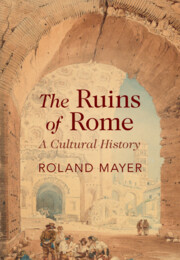Book contents
- The Ruins of Rome
- Frontispiece
- The Ruins of Rome
- Copyright page
- Contents
- Figures
- Preface
- Acknowledgements
- Abbreviations
- 1 Ruins in Antiquity
- 2 How Rome Became Ruinous
- 3 Mediaeval Responses to the Ruins of Rome
- 4 The Watershed
- 5 The Battle for the Ruins
- 6 From Topographical Treatise to Guidebook
- 7 The Ruins Visualised
- 8 ‘Virtual’ Rome
- 9 Remembering the Grand Tour
- 10 Ruins in the Landscape Garden
- 11 Conservation, Restoration and Presentation of Ruins
- 12 Literary Responses to the Ruins
- Epilogue
- Notes
- Bibliography
- Index
4 - The Watershed
Petrarch and His Successors
Published online by Cambridge University Press: 02 January 2025
- The Ruins of Rome
- Frontispiece
- The Ruins of Rome
- Copyright page
- Contents
- Figures
- Preface
- Acknowledgements
- Abbreviations
- 1 Ruins in Antiquity
- 2 How Rome Became Ruinous
- 3 Mediaeval Responses to the Ruins of Rome
- 4 The Watershed
- 5 The Battle for the Ruins
- 6 From Topographical Treatise to Guidebook
- 7 The Ruins Visualised
- 8 ‘Virtual’ Rome
- 9 Remembering the Grand Tour
- 10 Ruins in the Landscape Garden
- 11 Conservation, Restoration and Presentation of Ruins
- 12 Literary Responses to the Ruins
- Epilogue
- Notes
- Bibliography
- Index
Summary
True ruin-mindedness begins with the poet Petrarch, the subject along with his successors of the fourth chapter. He was the first person we know of who visited Rome with the intention of seeing the ruins. Thanks to his unrivalled knowledge of Latin literature, he viewed the ruins as ‘sites of memory’, complementary to and made comprehensible by the texts of Roman poets and historians. For Petrarch and his successors, the ruins became an essential part of the historical and cultural heritage of the ancient Romans, a material complement to the history of Livy and the poetry of Virgil. Such complementarity was crucial to endowing the ruins with some context and meaning; they were not just piles of broken rubble but a valuable part of the Roman cultural achievement as a whole. Petrarch’s enthusiasm was infectious and it can be claimed that he initiated two new disciplines, urban topography and antiquarianism, the subjects of the next two chapters, 5 and 6. From this point on, progression will be largely chronological, as the sentiment of ruin-mindedness is developed and enlarged.
Keywords
- Type
- Chapter
- Information
- The Ruins of RomeA Cultural History, pp. 53 - 66Publisher: Cambridge University PressPrint publication year: 2025

